| Pages:
1
2 |
Nickbb
Harmless

Posts: 25
Registered: 6-12-2012
Location: 3rd dimension
Member Is Offline
Mood: something other than a chemistry pun
|
|
Drying Iodine
How can you dry iodine without losing any product? I typically synthesize it by adding H2O2 and HCL to colorless iodine tincture
(simply a solution of iodine salts). The iodine is wet after doing this, and if you sit it out to fully dry most of it would have evaporated. Would
sublimating it work?
|
|
|
bahamuth
Hazard to Others
  
Posts: 384
Registered: 3-11-2009
Location: Norway
Member Is Offline
Mood: Under stimulated
|
|
Best way is to melt the iodine under concentrated sulfuric acid, and let cool.
That way you can just flush off the remaining sulfuric acid when you remove the now solid iodine chunk without retaining much if any water water.
I believe the yields would be more or less quantitative.
I've actually done this and it is by far the best way I've found.
Also worth mentioning is that this information is in several of the threads contained in this forum, but I didn't bother an extensive search.
Any sufficiently advanced technology is indistinguishable from magic.
|
|
|
Endimion17
International Hazard
    
Posts: 1468
Registered: 17-7-2011
Location: shores of a solar sea
Member Is Offline
Mood: speeding through time at the rate of 1 second per second
|
|
You don't synthesize iodine. You isolate it. It's an element, not a compound.
Work on a larger scale. Wash it with some cold water to remove the acid and press dry the isolated sample using a filter paper, pack into a small
bottle (to avoid sublimation loss) which fits both the sample and a vial of solid sodium hydroxide. Keep replacing the vial with fresh NaOH until
after 24 hours it doesn't show signs of deliquescence. Poke the iodine sample now and then to ensure there are no trapped bubbles of water. NaOH will
trap the water and hydrogen chloride leftovers.
You get crude iodine which is enough pure for most amateur applications. Further purification steps are intimate mixing with freshly fused quicklime
and sublimation on a cold finger or less complicated apparatus.
Larger amounts and small glassware, remember.
|
|
|
Nickbb
Harmless

Posts: 25
Registered: 6-12-2012
Location: 3rd dimension
Member Is Offline
Mood: something other than a chemistry pun
|
|
Alright thanks guys. I'll try both methods and see how they work the next time I isolate iodine.
|
|
|
mr.crow
National Hazard
   
Posts: 884
Registered: 9-9-2009
Location: Canada
Member Is Offline
Mood: 0xFF
|
|
I think the word synthesize can still be used. The compound is I2 and an oxidation reaction is happening from iodide. But anyways that's besides the
point.
Yes melt it under H2SO4, it forms an unreal looking solid chunk. Easy!
Then put it in a beaker on a hotplate and sublime/boil it onto a flask with cold water. Not as easy but incredibly beautiful to watch.
Subliming wet iodine doesn't work, the water condenses too.
Double, double toil and trouble; Fire burn, and caldron bubble
|
|
|
Endimion17
International Hazard
    
Posts: 1468
Registered: 17-7-2011
Location: shores of a solar sea
Member Is Offline
Mood: speeding through time at the rate of 1 second per second
|
|
Quote: Originally posted by mr.crow  | I think the word synthesize can still be used. The compound is I2 and an oxidation reaction is happening from iodide. But anyways that's besides the
point.
Yes melt it under H2SO4, it forms an unreal looking solid chunk. Easy!
Then put it in a beaker on a hotplate and sublime/boil it onto a flask with cold water. Not as easy but incredibly beautiful to watch.
Subliming wet iodine doesn't work, the water condenses too. |
No, it can not. I<sub>2</sub> is an element. Elements can not be chemically synthesized, but can be synthesized using nuclear processes.
It's one of the staples in chemisty, and before YouTube started spreading this bad "synthesize elements" meme via amateur chemistry videos, nobody
officially talked about synthetizing chemical elements.
The thing with the beaker and flask filled with hot water is a school demo experiment used to show how iodine vapors can directly deposit
(also teachers stubbornly spread disinformation that iodine doesn't melt, which is incorrect).
If one wants to purify iodine, and yields are important (because it's valuable and hard to get), beakers and flasks are not sufficient because losses
are substantial, and the deposited crystals are so thin and have such large surface they sublime easily.
This is needed. Actual ground glass joint apparatus is quite expensive, but you can do it using regular test tubes of different sizes and some
glass tubing. I've purified naphtalene in a similar apparatus.
The smaller the available volume is, the larger the yields become.
|
|
|
vmelkon
National Hazard
   
Posts: 669
Registered: 25-11-2011
Location: Canada
Member Is Offline
Mood: autoerotic asphyxiation
|
|
How about using anhydrous CaCl2? Mix the CaCl2 and iodine as best you can and then distill off the iodine.
|
|
|
neptunium
National Hazard
   
Posts: 989
Registered: 12-12-2011
Location: between Uranium and Plutonium
Member Is Offline
|
|
also worth trying , I mixed the slushy I2 with conc sulfuric acid and DCM (di chloro methane) separate with a sep funnel and let air dry (with a fan)
the remaining solution of DCM and I2, I2 remain as dry crystals . never had to heat anything!
|
|
|
thebean
Hazard to Others
  
Posts: 116
Registered: 26-9-2013
Location: Minnesota
Member Is Offline
Mood: Deprotonated
|
|
Do you have a video or picture of this, I'd be quite interested in seeing it and possibly trying it myself.
"You need a little bit of insanity to do great things."
-Henry Rollins
|
|
|
elementcollector1
International Hazard
    
Posts: 2684
Registered: 28-12-2011
Location: The Known Universe
Member Is Offline
Mood: Molten
|
|
Curiously, when I placed some of the 'wet' iodine under sulfuric acid, it dissolved to a black sludge that I couldn't separate the iodine out of.
Elements Collected:52/87
Latest Acquired: Cl
Next in Line: Nd
|
|
|
Pyro
International Hazard
    
Posts: 1305
Registered: 6-4-2012
Location: Gent, Belgium
Member Is Offline
Mood: No Mood
|
|
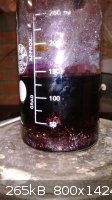
first the wet I2 slush is put into conc. H2SO4 (this can spatter and make I2 vapor depending on how wet it is)
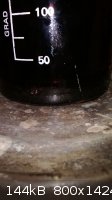
then it is heated until it melts
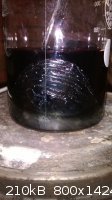
The beaker is held at around 45* for the I2 to cool
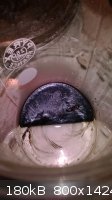
The H2SO4 is drained off and the lump of I2 is removed from the beaker with a dissection needle (force it between the I2 chunk and the beaker wall)
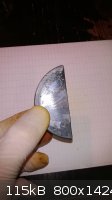
the I2 is surprisingly dense, that piece weighs in it 53.9g
It was later re-sublimed using small beaker and a flask of cold water to give little chunks (if you leave the flask on long enough the fine crystals
will become a thick (1-2mm) layer which can then be broken up and stored)
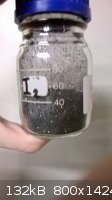
(this was from more than one batch)
[Edited on 17-12-2013 by Pyro]
all above information is intellectual property of Pyro.  |
|
|
elementcollector1
International Hazard
    
Posts: 2684
Registered: 28-12-2011
Location: The Known Universe
Member Is Offline
Mood: Molten
|
|
Nice. I actually prefer the lump form - it seems so odd that iodine can look like that.
Elements Collected:52/87
Latest Acquired: Cl
Next in Line: Nd
|
|
|
Pyro
International Hazard
    
Posts: 1305
Registered: 6-4-2012
Location: Gent, Belgium
Member Is Offline
Mood: No Mood
|
|
well yes, it is pretty, but re-sublimation makes it purer. i think its like 99,9+% if you re-sublime it once.
all above information is intellectual property of Pyro.  |
|
|
MrHomeScientist
International Hazard
    
Posts: 1806
Registered: 24-10-2010
Location: Flerovium
Member Is Offline
Mood: No Mood
|
|
I tried to sublime iodine once but kept getting water condensation on my cold flask that kept everything wet. Does this get eliminated with the
sulfuric acid drying step? My iodine wasn't damp at all, but I do live in a humid climate.
|
|
|
thebean
Hazard to Others
  
Posts: 116
Registered: 26-9-2013
Location: Minnesota
Member Is Offline
Mood: Deprotonated
|
|
Pyro, when you say 45* do you mean Celsius or Fahrenheit? This looks like a very interesting procedure, but does the it really dry the iodine?
"You need a little bit of insanity to do great things."
-Henry Rollins
|
|
|
Pyro
International Hazard
    
Posts: 1305
Registered: 6-4-2012
Location: Gent, Belgium
Member Is Offline
Mood: No Mood
|
|
when I say 45* I mean an angle, when I say 45*C I mean temperature. you want the I2 to form a lump, not a layer on the bottom of the beaker (I made
this mistake, it never comes out  ) )
I had to remove the flask of ice every now and again to get the I2 cake off, when I did that I wiped it with a paper towel just in case.
unless you dried your I2 in a dessicator or under H2SO4 it will always be a little bit moist
all above information is intellectual property of Pyro.  |
|
|
thebean
Hazard to Others
  
Posts: 116
Registered: 26-9-2013
Location: Minnesota
Member Is Offline
Mood: Deprotonated
|
|
Quote: Originally posted by Pyro  | when I say 45* I mean an angle, when I say 45*C I mean temperature. you want the I2 to form a lump, not a layer on the bottom of the beaker (I made
this mistake, it never comes out  ) )
I had to remove the flask of ice every now and again to get the I2 cake off, when I did that I wiped it with a paper towel just in case.
unless you dried your I2 in a dessicator or under H2SO4 it will always be a little bit moist |
Is this because H2SO4 "picks up" the water? Like in a nitration mix?
"You need a little bit of insanity to do great things."
-Henry Rollins
|
|
|
Pyro
International Hazard
    
Posts: 1305
Registered: 6-4-2012
Location: Gent, Belgium
Member Is Offline
Mood: No Mood
|
|
yep, and when you melt it it fuses into one solid block that you can dry manually
all above information is intellectual property of Pyro.  |
|
|
zenosx
Hazard to Others
  
Posts: 188
Registered: 7-7-2012
Location: East TN / Near Oak Ridge
Member Is Offline
Mood: Awaiting Results....
|
|
I will have to try the H2SO4 method. I have always used a filter paper full of dessicant sealed around the top of a beaker full of I2 to dry, then
sublimed it twice using a cold finger made from a test-tube and some glass tubing that works very well.
I am sure I lose much more than the H2SO4 method, I still have about 3 bottles to do an extraction from, will do this next time.
A question that sometimes drives me hazy: am I or are the others crazy?
Albert Einstein
|
|
|
Fantasma4500
International Hazard
    
Posts: 1681
Registered: 12-12-2012
Location: Dysrope (aka europe)
Member Is Offline
Mood: dangerously practical
|
|
i was just about to imply that you should wetten it with acetone so that it would evaporate off at low temperature but then i recalled that.. acetone
and iodine is not a good idea
keep that in mind, please (:
|
|
|
neptunium
National Hazard
   
Posts: 989
Registered: 12-12-2011
Location: between Uranium and Plutonium
Member Is Offline
|
|
Quote: Originally posted by Antiswat  | i was just about to imply that you should wetten it with acetone so that it would evaporate off at low temperature but then i recalled that.. acetone
and iodine is not a good idea
keep that in mind, please (: |
especially mixed with sulfuric acid!! no I used DCM and it work great !
|
|
|
neptunium
National Hazard
   
Posts: 989
Registered: 12-12-2011
Location: between Uranium and Plutonium
Member Is Offline
|
|
I tried the sulfuric methode and did get the lump of I2 shown on your picture ... however, how do you get rid of the sulfuric acid the lump is still
wet with it!
i put it in paper towel and it did dry it somewhat but the inside is still very much wet with H2SO4....
|
|
|
Pyro
International Hazard
    
Posts: 1305
Registered: 6-4-2012
Location: Gent, Belgium
Member Is Offline
Mood: No Mood
|
|
You pour out the H2SO4, dislodge the chunk of I2 and wash it with water. Then you can dry the surface with a paper towel. Or you can let it dry on
air. I left my chunk out for 4 days and only lost 0,1g
all above information is intellectual property of Pyro.  |
|
|
agent_entropy
Hazard to Self
 
Posts: 91
Registered: 17-7-2006
Location: U.S.
Member Is Offline
Mood: No Mood
|
|
I just tried the sulfuric acid method and had the same problem as neptunium (2 posts up) where I can easily dry the outside of the lump of I2 but the
inside is porous and the pores are filled with H2SO4. Does anyone have any suggestions on how to prevent this porosity or how to remove the H2SO4?
I was thinking about grinding up the lump into coarse granules and blotting them dry with a paper towel before re-sublimating. Anyone have a better
idea?
[Edited on 16-4-2015 by agent_entropy]
|
|
|
agent_entropy
Hazard to Self
 
Posts: 91
Registered: 17-7-2006
Location: U.S.
Member Is Offline
Mood: No Mood
|
|
I found a way to get rid of the remaining H2SO4:
The lump of I2 was ground into coarse chunks and blotted as dry as possible. Then the I2 was melted in a loosely stoppered flask without the H2SO4
blanket and the molten I2 was poured into a shallow glass tray. The rapid cooling appeared to have excluded all of the remaining H2SO4 from and the
acid was rinsed off of the cooled I2 film.
An improvised sublimator was fashioned using a test tube through a hole in a rubber stopper as a coldfinger and suspending it in the middle of a
flask. The flask was heated on a hotplate while coolant was supplied to the coldfinger. However, this produced small needle-like crystals of iodine
(not the best form due to the high surface area).
The remaining remaining I2 was placed in a sealed jar and placed atop a laboratory oven that is always on (in order to provide a small temperature
gradient), and there are now nice granular crystals slowly growing on the upper walls of the jar.
|
|
|
| Pages:
1
2 |